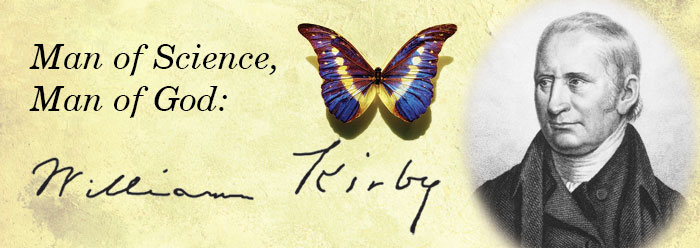Who: William Kirby
What: Father of Entomology
When: September 19, 1759 - July 4, 1850
Where: Born in Witnesham, Suffolk, England
William Kirby must have been an unusual fellow, since he derived such joy from studying insects. After graduating from Cambridge University in 1781, he took holy orders in 1782. His interest in natural history was sparked in 1791 when he met English botanist Sir James Edward Smith, with whom he corresponded to seek advice about founding a natural history museum at Ipswich School in Suffolk.
Throughout Kirby's life, he compiled an extensive insect collection. His first major work--Monographia Apum Angliae, about the bees of England--caught the attention of leading entomologists in Britain and abroad. He received a Master's degree with the intention of applying for a professorship in botany at Cambridge, but was denied due to his political views.1
Between 1815 and 1826, he and fellow British entomologist William Spence coauthored the four-volume An Introduction to Entomology: or Elements of the Natural History of Insects. Considered the foundational work in the field of entomology, Kirby introduced it in this way:
Having given you this full account of the external parts of insects, and their most remarkable variations; I must next direct your attention to such discoveries as have been made with regard to their Internal Anatomy and Physiology: a subject still more fertile, if possible, than the former in wonderful manifestations of the Power, Wisdom and Goodness of the Creator. 2
. . . [W]hen we ascribe a certain degree of intellect to these animals, we do not place them upon a par with man; since all the most wonderful parts of their economy, and those manipulations that exceed all our powers, we admit not to be the contrivance of the animals themselves, but the necessary results of faculties implanted in their constitution at the first creation by their Maker.3
Mankind and the animal kingdom were two distinct creations that shared no ancestors and were defined by wisdom.
There is this difference between intellect in man, and the rest of the animal creation. Their intellect teaches them to follow the lead of their senses, and make such use of the external world as their appetites or instincts incline them to,--and this is their wisdom; while the intellect of man, being associated with an immortal principle, and being in connexion with a world above that which his sense reveal to him, can, by aid derived from heaven, control those senses, and bring under his instinctive appetites, so as to render them obedient to the to hegemonichon, or governing power of his nature: and this is his wisdom.4
In 1835, Kirby authored the seventh Bridgewater Treatise, titled The History, Habits and Instincts of Animals. The first chapter, "Creation of Animals," argues that the very existence of animals testify to the Creator.
The infinite diversity of their forms and organs; the nice adaptation of these to their several functions; the beauty and elegance of a large number of them; the singularity of others; the variety of their motions; their geographical distribution; but, above all, their pre-eminent utility to mankind in every state and stage of life, render them objects of the deepest interest . . . so that arguments in proof of these primary attributes of the Godhead, drawn from the habits, instincts, and other adjuncts of the animal creation, are likely to meet with more universal attention.5
With Spence, Kirby helped to found the Entomological Society of London in 1833, to which he was appointed Honorary President for life. His Ipswich natural history museum opened in 1847, and he served as its president until his death in 1850. To this remarkable man, even the insects declared the glory of God.
References
- Kirby was a Tory, a party that supported the authority of the British monarchy.
- Kirby, W. 1826. An Introduction to Entomology: Vol. IV. London: Longman, Hurst, Rees, Orme, and Brown, 1.
- Ibid, 32.
- Ibid, 33.
- Kirby, W. 1835. The Seventh Bridgewater Treatise on the Power, Wisdom, and Goodness of God as Manifested in the Creation: The History, Habits and Instinct of Animals, Vol. 1. London: William Pickering, 1-2.
* Ms. Dao is Assistant Editor.
Cite this article: Dao, C. 2008. Man of Science, Man of God: William Kirby. Acts & Facts. 37 (7): 8.




